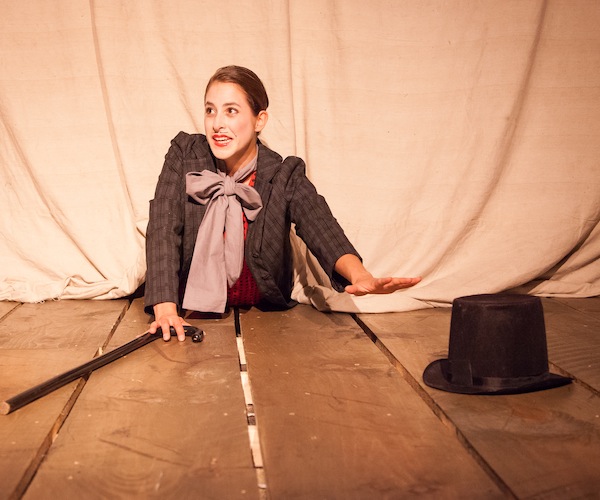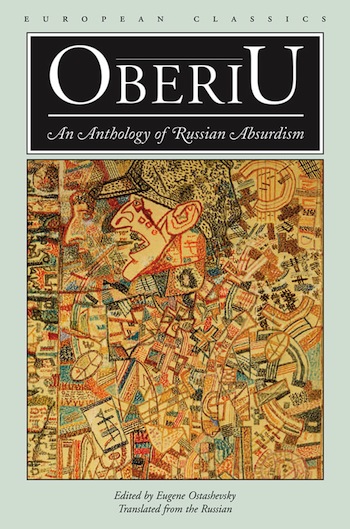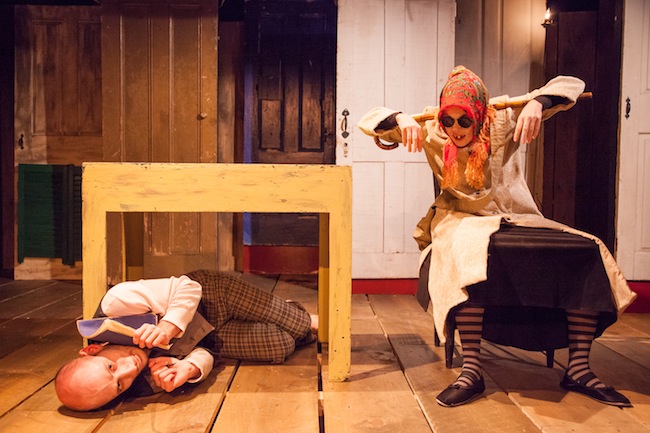Fuse Theater Review: “Knock! The Daniil Kharms Project” — Absurdity Knocked About
Imaginary Beasts is to be congratulated for bringing public attention to the brilliant, idiosyncratic-to–the-max-and-beyond work of Daniil Kharms, a writer silenced by Stalin.
Knock! The Daniil Kharms Project, adaptation by Matthew McMahan and the Imaginary Beasts ensemble. Translation from the Russian by Irina Yakubovskaya. Directed by Matthew Woods. Staged by Imaginary Beasts at the Boston Center for the Arts, Boston, MA, through October 18.
By Bill Marx
Stalinist authoritarian dimmed or snuffed out a number of brilliant literary lights. Now, even though the works of these authors have been rescued from the Cheka’s vaults or oblivion, their exotic glitter is still not being appreciated. The irony is exasperating: besieged writers such as Andrei Platonov, Sigizmund Krzhizhanovsky, and Daniil Kharms continue to be penalized for the anarchistic weirdness of their fictional worlds, as if Stalin’s ghost was calling the shots. Censored, imprisoned, and harrassed by the secret police during their lifetime, these writers are now greeted in the West with faint curiosity (aside from the enthusiasm of some academics), their resonance as artistic dissenters (against Socialist Realism) now considered anachronistic. Their texts (in some cases made available in uncut form for the first time) are available in translation, but its experimentalism is greeted with a ho-hum silence, their zesty, askew ideas dismissed as historical curiosities.
Given the timidity of today’s mainstream culture re-penalizing the marginalized is understandable but damn infuriating: it is an act of cultural impoverishment. Kharms and company shouldn’t be left to molder in a time capsule — their strange sublime nonsense (a mix of the crude, the lyrical, and the mystical) still captivates. Different as each of these writers are, they are united by a powerful surrealist vision that goes beyond mere political lampoon into exhilarating realms of metaphysical assault. To my mind, Platonov is one of the greatest writers of the 20th century, Krzhizhanovsky a deadpan dadesque master in the grotesque antic mode of Kafka and Borges, and Kharms, who specialized in gleeful destructions of language, logic, and everyday objects (via his short stories, sketches, poems, children’s literature, and plays), anticipates absurdism.
Kharms was an important part of OBERIU (Ob’edinenie real’nogo iskusstva, or the “Union of Real Art”), a short-lived modernist movement – referred to by some critics as Russia’s last avant-garde. Its members came of age after the October revolution and, partly in reaction to the vicious repression around them, sought artistic liberation though mischievous destruction of the rules of grammar, narrative, reason, etc. The heyday of the core membership of the group was during 1927-1930: Kharms published little of his work during his lifetime (his children’s lit was admired, even through he hated kids), and by the early ’40s most of the membership had been murdered. Khrams was tossed into a prison psychiatric ward where he died of starvation in 1942. (Perhaps Kharms was one of the ‘real life’ inspirations for Lev Isakovich Gurevich, a dissident poet confined by the state into an insane asylum in Venedikt Erofeev’s pitch black 1985 tragicomedy Walpurgis Night, which has just been translated by Marian Schwartz for Yale University Press.) A suitcase filled with Kharms’s work was saved and surfaced decades later.
OBERIU’S stated mission was not to express emptiness through nonsense, but communicate a truth that sits beyond the routines of a mechanized society and its automatized language. As Eugene Ostashevsky writes in his introduction to his excellent anthology OBERIU: An Anthology of Russian Absurdism (Northwestern University Press, 2006), these writers “start off by regarding intuition as the tool for obtaining knowledge of things-in-themselves, that is, of the “true reality” inaccessible to perception and reason.” OBERIU was obsessed with breaking free of rote language, their rebellion moving beyond dream into out-and-out gibberish, made-up languages that liberated because they exploded conventions (“destroying the protocols of semantic coherence and linguistic realism”). It is an important distinction to make when comparing the absurdity of Kharms and Samuel Beckett; the latter’s figures are sucked into the earth while Kharms vaporizes the world (and the words on the page) for the sake of freeing us of the everyday. Part of the impulse behind this radical escapism was to reach some sort of a mysterious beyond (“quietly the ocean splashes/ the looming cliffs cry doo doo doo/ quietly the ocean flashes/ a man is singing though a lute/ quietly over the sea/ run white elephants of fear”), though there is no doubt a desire to leave a political hell behind:
We’ve died on the fields of the everyday.
No hope is left to lead the way.
Our dreams of happiness are done —
Poverty has won.
— April 3, 1937
Sorry for the long wind-up, but before taking up the Imaginary Beasts production of a gathering of Kharms’ playlets, short stories, and jottings, I wanted to make my critical admiration for its effort very clear — in an increasingly homogenized contemporary theatrical menu festooned with an inevitably inspiring realism (What will keep the subscribers, raised on TV, happy?) the group is to be congratulated for bringing attention to the neglected writing of a brilliant, idocycratic-to-the max-and-beyond author. Those interested in Russian writing of the 20th century, the absolutely surreal, and political theater at its most oblique should take in this production of goings-on that teeter-totter between the ridiculous and the nonsensical. The set design of different colored doors and bare hanging bulbs creates a nice Dadesque atmosphere, the translation by Irina Yakubovskaya is suitably playful, and the selection, if narrow in terms of what Kharms was capable of (there are few examples of his freewheeling deconstructions of language), contains plenty of weird happenings, from self-defeating meditations on “what is smart and what is stupid” to a vision of a Grandma “who drank ink, ate beets, and cleaned her ears out with matches.”
I brought up Beckett earlier because it seems to me that his influence — at least in terms of the vaudeville approach that has been applied to his plays — helps explain the strengths and weakness of Knock! The Daniil Kharms Project. Sometimes Kharms’s wayward take on the irrational benefits from a red-nosed approach, as in the title sketch, in which a woman is repeatedly interrupted from using an ax. But, by having the female role played in drag, Imaginary Beasts tries too hard to make the material go over ‘big’ – there are moments when the young and energic troupe (Michael Chodos, Sarah Gazdowicz, Molly Kimmerling, Mariagrazia LaFauci, Joey Pelletier, Libby Schap, William Schuller, Noah Simes, Kaitee Tredway, Michael Underhill) strains at feeling it has to deliver the mythical ‘boffo.’ (At least that was the case at the preview performance I attended.) Silly wigs, baggy pants, top hats, flipping tables about, acrobatics, mugging, hurdy gurdy music — this is the kind of knockabout that knocks itself silly. And wears out its welcome fairly quickly.
Who knows how Kharms would have wanted these pieces produced? No doubt in a slapdash manner — but perhaps he would have wanted there to be as much deadpan as there was daffy. Moreover, Kharms can’t be dramatized today without spectators being mindful of how much of his fantastic foolishness is not only the brazen tail end of Russian modernism, but a response — antic, bizarre, defensive — to the brutality of history. Amusing as the Beasts can be, we miss the philosophical angst in Kharms’s craziness, the chill in his Alice-in-Wonderland lyricism. Perhaps because of its melancholic mood and music, the closing dramatization of Kharms’s wistful poem “A Man Once Walked Out of His House” suggested what might have been:
He walked as far as he could see:
He saw what lay ahead.
He never drank.
He never slept,
Nor slept nor drank or ate.
That urge to dissolve society and language, to whip up on the page a lighter-than-air escape from the inescapable, that is very much part of Kharms’s brilliance — the imagination dreaming up its farcical exit from the world.
(All Kharms translations in this review from OBERIU: An Anthology of Russian Absurdism)
Bill Marx is the Editor-in-Chief of The Arts Fuse. For over three decades, he has written about arts and culture for print, broadcast, and online. He has regularly reviewed theater for National Public Radio Station WBUR and The Boston Globe. He created and edited WBUR Online Arts, a cultural webzine that in 2004 won an Online Journalism Award for Specialty Journalism. In 2007 he created The Arts Fuse, an online magazine dedicated to covering arts and culture in Boston and throughout New England.
Tagged: Daniil Kharms, imaginary-beasts, Knock! The Daniil Kharms Project



